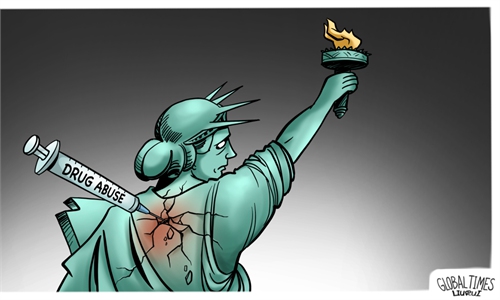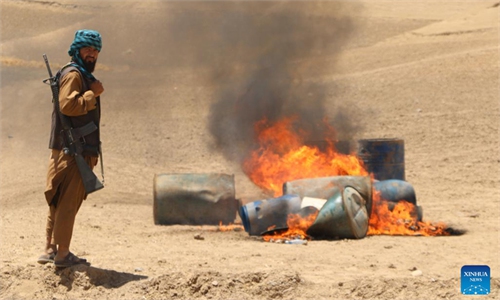China builds network to monitor, regulate psychotropic substances, a rebuttal to US reckless accusations against China over fentanyl

Police officer tells drug control stories to students at the Central Junior Middle School in Baoying county, Yangzhou, East China’s Jiangsu Province on June 26, 2023. Photo: VCG
Chinese authorities recently disclosed in detail measures taken in regulating narcotic drugs and psychotropic substances, including a system that will be monitoring the prescription, purchase and usage of the substances, making sure each one of them is traceable in order to prevent the drugs from sliding into the hands of outlaws.
The disclosure not only highlights China's latest efforts in shoring up regulation on new psychoactive substances, it also served as a strong rebuttal to the US criticism on China over its opioid crisis, for which the blame lies at its own feet, experts said.
China has formed a comprehensive surveillance web targeting narcotic drugs and psychotropic substances, covering areas from prescription to usage of those substances, the Global Times learned from authorities.
At the prescription level, pharmacists in high-level hospitals are told to report any abnormal increase of certain drugs and any sign of using dependence-producing drug, Fan Bifa, a doctor from the China-Japan Friendship Hospital in Beijing, said.
Authorities have also stepped-up efforts in educating medical staff how to prescribe less addictive medication to patients.
The country's narcotics control authorities trace undetected substances via drug users, places where drugs are often illegally traded and by testing sewage water. Once unregulated substances are found, the narcotics control department works with drug control authorities, and will typically add those substances into a regulation list, the Global Times learned.
Xu Buyi, an engineer from the National Narcotics Laboratory's Sichuan branch explained that by tracing sewage water, they found a concentration of etomidate synthesis, an anesthetic agent. "Authorities upgraded regulation on etomidate this February, which is really fast," said Xu.
Earlier in April, China's Ministry of Public Security (MPS), National Medical Products Administration and National Health Commission jointly published a notice including more substances into regulation of psychotropic substances. To date, China has regulated 456 types of narcotic drugs and psychotropic substances and all forms of fentanyl and synthetic cannabinoids.
MPS published a report last month, noting that since drugs are not easily available in China, some drug users resort to psychotropic substances, new psychoactive substances and other substances.
There are risks laden on every section of producing, circulating and usage of these substances; and there is a fine line between using them legally and violating the law, according to Li Wenjun, a professor from People's Public Security University of China.
Li also called for comprehensive regulation over new substances, including strengthening education, ramping up border checks and using legal methods.
Rebuttal to groundless accusation
As China continues to tighten regulation over new types of psychoactive substances, the US' main reaction has been to attempt to scapegoat China for a US domestic crisis.
The latest case being when US Senate Majority Leader Chuck Schumer said on Sunday that he will push to include in upcoming defense policy legislation a bipartisan amendment to sanction China over its alleged role in producing the synthetic opioid fentanyl.
On May 30, the US sanctioned 17 individuals and entities in China and Mexico, accusing them of shipping or selling equipment that Mexican drug cartels use to manufacture fentanyl-spiked fake pills that are in part fueling the US opioid epidemic. The Chinese Foreign Ministry strongly slammed the sanctions.
Some US officials also baselessly attacked China for providing substances to Mexico in producing fentanyl. In response, the Chinese embassy in Mexico said that after China regulated all forms of fentanyl, it had not received any notice from other countries on receiving fentanyl from China. "The root of US opioid crisis lies on itself, and the right solution is to reduce domestic demand and supply," the embassy said in a statement.
Drug deaths nationwide hit a new record in 2022 in the US. Some 109,680 people died as the fentanyl crisis continued to deepen, according to preliminary data released by the US Centers for Disease Control and Prevention in May.
In 2019, China scheduled all forms of fentanyl, becoming the only major country to do so on a permanent basis. In the US, fentanyl analogues are only temporarily controlled, with the classification set to expire in December 2024.
Wang Yi, director of the Office of the Foreign Affairs Commission of the Communist Party of China (CPC) Central Committee met with Blinken on the sidelines of a series of ASEAN foreign ministers' meetings last week. US officials said that the two sides spent a fair amount of time discussing fentanyl. In particular, Blinken emphasized the importance of the US and China working together to disrupt the global flow of synthetic drugs, particularly fentanyl.
Like cooperation on economic, climate and other issues, if the US sincerely wants to engage China into cooperation on regulating fentanyl, it should show sincerity, including stop using fentanyl to throw mud at China, using the substance as pretext to crackdown Chinese companies and citizens; and to properly address its own domestic drug abuse problems first, Li Haidong, a professor at the China Foreign Affairs University, told the Global Times.


